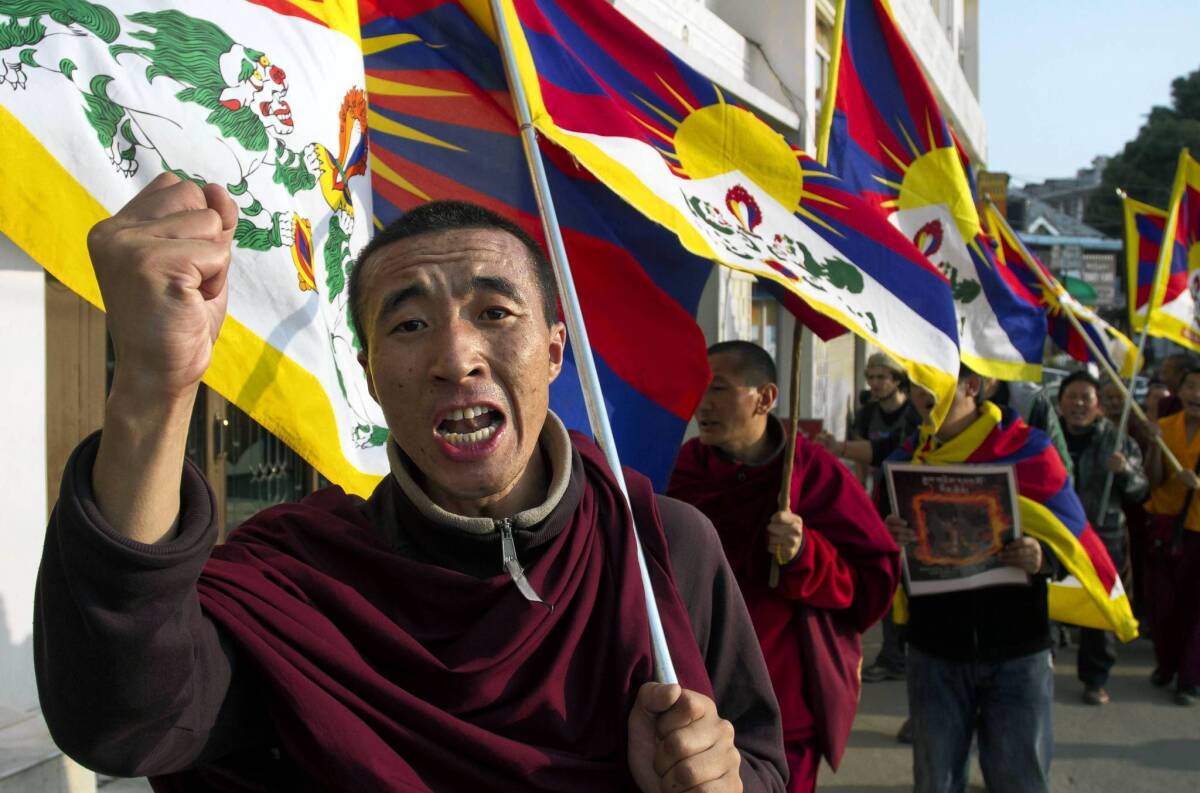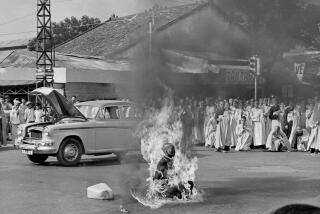In China, self-immolations continue as party congress opens

BEIJING — As China launched its 18th Communist Party congress on Thursday, a record number of Tibetans immolated themselves in a stark illustration of the internal tensions facing the country’s new leadership.
Over a 48-hour period, at least five Tibetans were reported to have set themselves on fire in western China. Most of them were teenagers.
As many as 6,000 people demonstrated against the government Thursday afternoon in Tongren, a monastery town in Qinghai province, after two self-immolations — a 23-year-old woman on Wednesday and a young former monk on Thursday, exile groups reported.
“The situation there is very tense as Chinese armed forces have placed severe restrictions on movement in the town and are now closing in on the protesters,” a member of the Tibetan parliament in exile told the Tibetan news service Phayul.
“We have heard that 2,000 to 6,000 people demonstrated, which are plausible numbers given that there have been protests of that size before,” said Harriet Beaumont, a spokeswoman for the London-based group Free Tibet.
She said the protests were carried out in response to the heavy troop presence and other stifling security measures, intimidating footage on television and harsh sentences for involvement in a protest or disclosure about demonstrations to outsiders.
“Tibetans were also aware of the approach of the congress and that might be a factor in the serious escalation in the last few days,” Beaumont said.
In a speech opening the congress, outgoing President Hu Jintao acknowledged criticism that China’s economic development had come at the expense of many of its people, and said authorities would crack down on high-level corruption. The government also faces widespread accusations of repression leveled by ethnic groups such as Tibetans and Uighurs in the country’s far northwest.
In the run-up to the congress, Chinese authorities blanketed Tibetan neighborhoods with armed police in riot gear bearing fire extinguishers and erected barricades and checkpoints. Some Tibetans suspected of disseminating anti-government information via email or social networking sites were arrested.
Wednesday was the deadliest day since Tibetans began setting themselves on fire last year.
Three such protesters were monks ages 15 and 16 from a monastery on the outskirts of Aba, the Sichuan province county where the self-immolations began. They set themselves ablaze simultaneously outside the town’s Public Security Bureau, chanting “freedom for Tibet” and calling for the return of the Dalai Lama, Tibet’s exiled spiritual leader.
The youngest, 15-year-old Dorje, died on the spot, but the other two were taken to a hospital by police. The teenagers were all said to be from nomadic families.
About three hours later, 200 miles to the north, the woman in Tongren immolated herself in a pasture near her village. She was identified as Tamdrin Tso, the mother of a 5-year-old boy.
Then on Thursday afternoon, a former monk called Jinpa immolated himself in a public square across from the town’s main monastery, setting off the protests.
The exile groups said that nomads from throughout the county joined in the demonstrations and that high school students ripped down Chinese flags from public buildings.
Few details were available about another self-immolation reported to have taken place Wednesday in Driru county in the Tibet Autonomous Region.
Until recently, self-immolation had been unheard of among Tibetan Buddhists, who believe suicide destroys not only the body, but also the chance of being reincarnated as a human being.
Last month, seven Tibetans killed themselves in as many days in anger over Chinese repression, bringing the total number of self-immolations to about 60 since March 2011. On Sunday, a 25-year-old man reported to be an artist with two children set himself on fire in Tongren.
“People are really desperate. They feel there is no exit,” said Tenzin Losel, a Tibetan businessman living in Dharamsala, India, where the Tibetan government in exile is based. “Whenever they try to speak up or make demands, it is met with a brutal crackdown by the Chinese government.”
Thinlay Gyatso, a Tibetan academic who has two relatives who have immolated themselves in Gansu province since the summer, said China’s security measures have caused the problem.
“Tibet is like an open prison,” he said. “There are checkpoints everywhere where people are looking at your IDs. People are really frustrated.”
The weeklong congress is a political showcase for the Chinese Communist Party, which is making the transition to a new generation of leadership. Hu is leaving office after two five-year terms and will be replaced as secretary-general of the party by Vice President Xi Jinping, who will take over the presidency in March. Premier Wen Jiabao is to be replaced by Li Keqiang.
Hu didn’t address the Tibetan situation in his opening speech, although he referred repeatedly to the need for social harmony.
“Social harmony is an inherent attribute of socialism with Chinese characteristics,” Hu said.
One of the Communist Party’s handpicked Tibetan delegates to the congress appeared flustered when journalists asked about the immolations.
“Can I not answer that question?” she begged in response.
More to Read
Sign up for Essential California
The most important California stories and recommendations in your inbox every morning.
You may occasionally receive promotional content from the Los Angeles Times.










